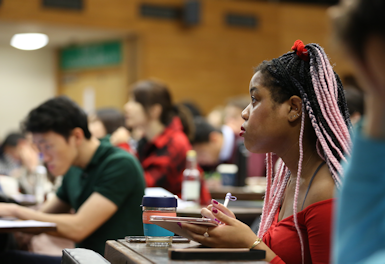
This is the most advanced programme of graduate studies in Economics at Cambridge. Upon its completion, candidates are awarded a PhD degree for producing a thesis of high-quality, original, and publishable research over a period of four years (full-time) and seven years (part-time).
A good number of our PhD students receive full or partial funding for their studies, from a variety of funding bodies, such as the ESRC and the Gates Foundation.
Our PhD students receive high quality training on a variety of research methods and are exposed to cutting edge research conducted by our own Faculty members, as well visitors to the Faculty (via the Cambridge-INET Institute, seminars, PhD workshops, locally organised conferences, etc.). Faculty members can supervise a wide range of topics from six broadly defined research areas: microeconomic theory, macroeconomics, econometrics, applied microeconomics, economic history and alternative approaches to economics.
PhD students in Cambridge benefit from a high faculty-to-student ratio and therefore form close relationships with many Faculty members. They also forge strong links with our post-doctoral researchers, and they actively participate in the Faculty’s vibrant research life. They have access to a wide range of facilities, such as their own desk/office space in the same building as regular Faculty members, computing equipment, a variety of software and access to a wide range of databases.
PhD students are encouraged to attend academic conferences and showcase their research work in a variety of ways. Upon completions of their studies, many of our PhD students become academics, or researchers at international or government research institutions (see recent job market placements here).
Explore here the profiles of our current PhD students.
Study
To obtain the degree of PhD in Economics, students need to:
1. Obtain the Certificate of Postgraduate Study (CPGS). If accepted for the PhD degree, you will be registered initially for the Certificate of Postgraduate Study (CPGS) in Economics. Students registered for the CPGS are required to:
- Attend the 'How to do Economics' lecture course. Other postgraduate courses in research methods are organised by the Schools of Humanities and Social Sciences and the Physical Sciences, and are available to all PhD students.
- Undertake a minimum of four courses from PhD or MPhil Modules from at least two subject areas. You must achieve a pass mark (60%) on each component of the coursework. Students who fail any examinations will be called for a viva on the coursework.

- Write a research proposal (maximum length 10,000 words) that should include a review of the relevant literature, a research question, and outline of a research design and methods. The expectation is that this proposal will be for a piece of research that could form the basis of one chapter of a PhD dissertation. You will be given an oral examination on this piece of work and must perform to a satisfactory standard.
- Attend (a) one of the three research workshops (on microeconomics, macroeconomics or econometrics) at which research students present both their own work and recent papers in the literature - assessment of workshops will be arranged by course organisers; (b) attend at least one of the Faculty's general seminars in which papers are given both by outside speakers and Faculty members;
- To be registered for the PhD submit an acceptable piece of research (first year chapter) of not more than 20,000 words. The piece of research submitted must be of a standard that would enable it to form the basis of one-third of your eventual PhD thesis. This means that it must contain research that could be expanded upon to constitute one-third of the PhD thesis.
2. Once upgraded to PhD status, a student concentrates on her or his PhD dissertation. In general the thesis format is either in the form of a book divided into chapters, or of three or more connected articles; in either case, the Faculty has a strict limit of 60,000 words. As research progresses, there will be opportunities to present work in progress at research workshops attended by Faculty members and research students. PhD students will also be required to attend research seminars given by outside speakers and Faculty members.
Assessment

Upon completion and submission of the PhD thesis, students do an oral examination (viva) with two examiners, one internal to the University of Cambridge (not the supervisor or research advisor), and one external (from any other University in the UK or the rest of the world).
After a successful thesis defence, the examiners recommend awarding the degree of PhD.
